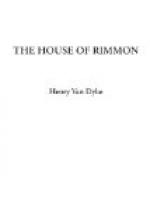NAAMAN:
From
hers.
SABALLIDIN:
And from that hour the curse began to
work.
NAAMAN:
But did she not have pity when she saw
Me smitten? Did she not beseech
the King
For letters and a guard to make this journey?
Has she not been the fountain of my hope,
My comforter and my most faithful guide
In this adventure of the dark? All
this
Is proof of perfect love that would have
shared
A leper’s doom rather than give
me up.
Can I doubt her who dared to love like
this?
SABALLIDIN:
O master, doubt her not,—but
know her name;
Ruahmah! It was she alone who wrought
This wondrous work of love. She
won the King
By the strong pleading of resistless hope
To furnish forth this company. She
led
Our march, kept us in heart, fought off
despair,
Offered herself to you as to her god,
Watched over you as if you were her child,
Prepared your food, your cup, with her
own hands,
Sang you asleep at night, awake at dawn,—
NAAMAN: [Interrupting.]
Enough! I do remember every hour
Of that sweet comradeship! And now
her voice
Wakens the echoes in my lonely breast;
The perfume of her presence fills my sense
With longing. All my soul cries
out in vain
For her embracing, satisfying love,
her eyes and called her my Ruahmah!
[To his soldiers.]
Away! away! I burn to take the road
That leads me back to Rimmon’s House,—
But not to bow,—by God, never
to bow!
TIME: Three days later
SCENE II
Inner court of the House of Rimmon; a temple with huge pillars at each side. In the right foreground the seat of the King; at the left, of equal height, the seat of the High Priest. In the background a broad flight of steps, rising to a curtain of cloudy gray, embroidered with two gigantic hands holding thunderbolts. The temple is in half darkness at first. Enter KHAMMA and NUBTA, robed as Kharimati, or religious dancers, in gowns of black gauze with yellow embroideries and mantles.
KHAMMA:
All is ready for the rites of worship;
our lady will play a great part
in them. She has put on her Tyrian
robes, and all her ornaments.
NUBTA:
That is a sure sign of a religious purpose.
She is most devout, our
lady Tsarpi!
KHAMMA:
A favourite of Rimmon, too! The
High Priest has assured her of it.
He is a great man,—next to
the King, now that Naaman is gone.
NUBTA:
But if Naaman should come back, healed
of the leprosy?
KHAMMA:
How can he come back? The Hebrew
slave that went away with him, when
they caught her, said that he was dead.
The High Priest has shut her
up in the prison of the temple, accusing
her of her master’s death.




